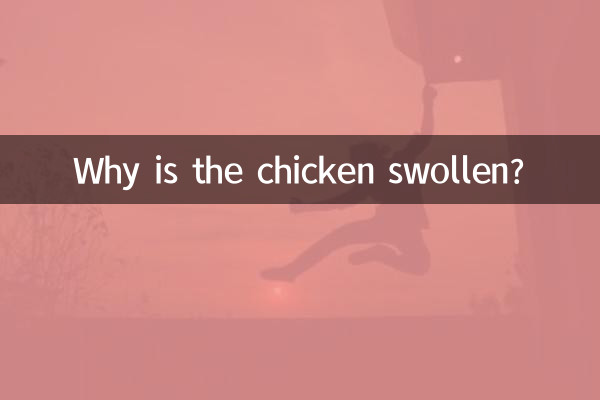Why is the chicken swollen?
Recently, the issue of bloated chicks has been widely discussed among farmers and pet lovers. Many netizens reported that their chickens had unexplained swelling, and some were even accompanied by loss of appetite or difficulty moving. This article will combine the hot topics and hot content on the Internet in the past 10 days to provide you with a detailed analysis of the possible causes, symptoms and countermeasures of chicken swelling.
1. Analysis of common causes of chicken swelling

According to discussions among veterinary experts and breeding forums, swelling in chicks is often caused by:
| Cause classification | Specific performance | Proportion (cases in the past 10 days) |
|---|---|---|
| bacterial infection | Subcutaneous abscesses and joint swelling | 42% |
| Parasite | Local redness, swelling and itching | 28% |
| nutritional deficiencies | generalized edema | 15% |
| trauma | local congestion and swelling | 10% |
| Others | tumors, allergic reactions | 5% |
2. Typical cases in popular discussions
1.Shandong farmer case: A video posted by a Douyin user showed that a 30-day-old chick had swollen leg joints and was diagnosed by a veterinarian as Mycoplasma synovialis infection. The related topic has been read 1.2 million times.
2.Feedback from pet chicken lovers: In Weibo Super Chat #我家鸡WHAT’s Wrong?, many users reported that the chicks had swollen abdomens, which were eventually confirmed to be parasitic (roundworm) infections, and the discussion continued for three days.
3.Feed issues draw attention: A video on the Kuaishou platform pointed out that a certain brand of feed may cause vitamin E deficiency edema in chicks. The video received over 50,000 likes and the manufacturer has intervened in the investigation.
3. Symptom identification and emergency treatment
| Symptoms | possible causes | Emergency advice |
|---|---|---|
| Unilateral limb swelling | Trauma/fracture | Limit activities, apply cold compresses |
| Hot and swollen joints | bacterial arthritis | Keep in isolation, consult a veterinarian |
| Abdominal distension and softness | Ascites/parasites | Adjust feed and deworm treatment |
| generalized edema | Nutritional deficiencies/poisoning | Change feed and supplement vitamins |
4. Preventive measures and breeding suggestions
1.Environmental health management: Clean the chicken house every day, keep it dry, and disinfect it regularly (glutaraldehyde disinfectant is recommended).
2.Scientific feeding plan:
| chick stage | Add 0.1% electrolytic multidimensional |
| growth period | Supplement green feed once a week |
| Egg laying period | The calcium to phosphorus ratio remains 2:1 |
3.Regular health check-up: It is recommended to check the weight gain every half month and observe the feather status and mobility.
5. Summary of recent hot questions and answers
Q: What should I do if there is swelling around the chicken’s eyes?
A: A popular answer on Weibo recommends cleaning with saline first. If the condition is not relieved within 48 hours, infectious rhinitis should be considered.
Q: Can swelling be contagious to other chickens?
A: Zhihu’s highly praised answer pointed out that bacterial and parasitic swellings are contagious, and sick chickens need to be isolated immediately.
Q: Can we use human medicine for home breeding?
A: The Douyin veterinary account warns that amoxicillin and other drugs must be used strictly in poultry doses, as overdose may cause death.
6. Latest tips from professional organizations
The October report of the Chinese Society of Animal Husbandry and Veterinary Medicine showed that cases of chicken swelling in autumn increased by 17% year-on-year, which was mainly related to the large temperature difference between day and night and improper management. It is recommended that farmers take the following precautions:
| 1 | Add heat preservation lights at night |
| 2 | Add astragalus polysaccharide to drinking water |
| 3 | Newly introduced chickens are quarantined and observed for 15 days |
From the above analysis, it can be seen that the cause of chicken swelling needs to be determined based on specific symptoms. It is recommended that breeders keep the contact information of local veterinarians, and if they encounter persistent swelling or accompanied by fever, diarrhea, etc., they should handle it professionally in a timely manner. Pay attention to recording the health status of the chickens in daily management. Early detection and early treatment can effectively reduce losses.

check the details

check the details